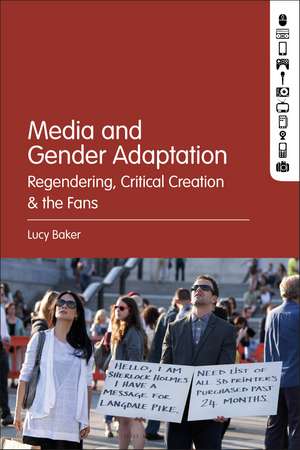Media and Gender Adaptation: Regendering, Critical Creation and the Fans
Autor Dr. Lucy Irene Bakeren Limba Engleză Paperback – 21 aug 2024
| Toate formatele și edițiile | Preț | Express |
|---|---|---|
| Paperback (1) | 190.06 lei 3-5 săpt. | |
| Bloomsbury Publishing – 21 aug 2024 | 190.06 lei 3-5 săpt. | |
| Hardback (1) | 496.71 lei 6-8 săpt. | |
| Bloomsbury Publishing – 22 feb 2023 | 496.71 lei 6-8 săpt. |
Preț: 190.06 lei
Preț vechi: 248.67 lei
-24% Nou
Puncte Express: 285
Preț estimativ în valută:
36.37€ • 39.63$ • 30.65£
36.37€ • 39.63$ • 30.65£
Carte disponibilă
Livrare economică 02-16 aprilie
Preluare comenzi: 021 569.72.76
Specificații
ISBN-13: 9781501370106
ISBN-10: 1501370103
Pagini: 200
Dimensiuni: 152 x 229 x 25 mm
Greutate: 0.27 kg
Editura: Bloomsbury Publishing
Colecția Bloomsbury Academic
Locul publicării:New York, United States
ISBN-10: 1501370103
Pagini: 200
Dimensiuni: 152 x 229 x 25 mm
Greutate: 0.27 kg
Editura: Bloomsbury Publishing
Colecția Bloomsbury Academic
Locul publicării:New York, United States
Caracteristici
Examines the negative responses and the distress of fans who object to gender changes
Notă biografică
Lucy Irene Baker researches and lectures about screen studies, media, humanities, and gender in Australia, and writes about digital communities, genre,, gender in media, and fans.
Cuprins
DedicationAcknowledgements Introduction Section 1: Data and theories 1. Regendering Research 2. Fans and Regendering 3. Theories 4. What does 'Playing with Gender' Mean? Section 2: Case Studies5. A Case Study of Fannish Regendering 6. Gender is a Battlefield 7. Elementary and Regendering the Classics 8. Ghostbusters: Sex and Science 9. Doctor-ess Who? ConclusionBibliographyAppendix 1: Survey QuestionsAppendix 2: Interview Questions Index
Recenzii
Lucy Irene Baker's Media and Gender Adaptation challenges us to look at fandom and its influence on the media in new and productive ways. In her thorough and detailed research, she demonstrates how regendering means more than just changing the character's gender; it's a way of unsettling the cultural narrative entirely. Baker explores the nuances of`a regendered main character through iterations both subcultural and mainstream - Elementary, Ghostbusters, and Doctor Who; fan work and beyond. In an era where toxic fandom dominates headlines, Baker's exploration offers a compelling counter. Sure to complicate and challenge, Media and Gender Adaptation takes fandom and fan studies in exciting new directions.
With Media and Gender Adaptation, Lucy Irene Baker has produced an enthralling and vital account of the ways that fans and professionals have powerfully adapted popular media works through regendering. Beautifully written and featuring a range of vibrant case studies on series such as Sherlock Holmes, Ghostbusters and Doctor Who, this text also features surveys and interviews with fans, creators and wider audiences. Through this, Baker valuably allows us to explore deeply the key factors at work within regendering, and the responses some media interpretations have received. This work is an absolute must-read for anyone interested in media and gender.
In Media and Gender Adaptation, Lucy Irene Baker makes a substantial and welcome addition to the discipline of popular culture, media and fan studies by critically examining an understudied, yet widely popular phenomenon, that of "regendering" characters in popular media. This practice, in which well-known characters are presented as a different gender, is extremely prevalent both in mainstream media adaptations as well as fan created works, and is often a flashpoint for cultural debate. Baker's analysis encompasses these debates skillfully and brings together multiple threads to present a highly readable and cogent analysis that will be useful to scholars of popular media as well as general readers.
With Media and Gender Adaptation, Lucy Irene Baker has produced an enthralling and vital account of the ways that fans and professionals have powerfully adapted popular media works through regendering. Beautifully written and featuring a range of vibrant case studies on series such as Sherlock Holmes, Ghostbusters and Doctor Who, this text also features surveys and interviews with fans, creators and wider audiences. Through this, Baker valuably allows us to explore deeply the key factors at work within regendering, and the responses some media interpretations have received. This work is an absolute must-read for anyone interested in media and gender.
In Media and Gender Adaptation, Lucy Irene Baker makes a substantial and welcome addition to the discipline of popular culture, media and fan studies by critically examining an understudied, yet widely popular phenomenon, that of "regendering" characters in popular media. This practice, in which well-known characters are presented as a different gender, is extremely prevalent both in mainstream media adaptations as well as fan created works, and is often a flashpoint for cultural debate. Baker's analysis encompasses these debates skillfully and brings together multiple threads to present a highly readable and cogent analysis that will be useful to scholars of popular media as well as general readers.
